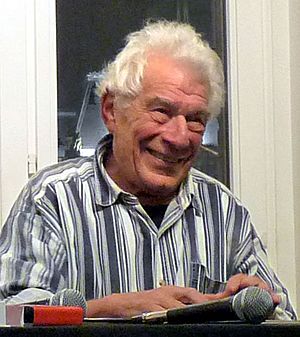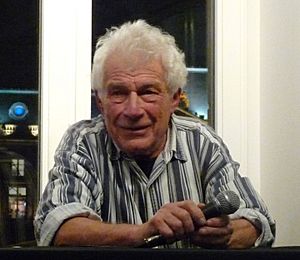John Berger facts for kids
Quick facts for kids
John Berger
|
|
|---|---|

Berger in 2009
|
|
| Born | John Peter Berger 5 November 1926 London, England |
| Died | 2 January 2017 (aged 90) Antony, Hauts-de-Seine, France |
| Occupation |
|
| Language | English |
| Education | St Edward's School, Oxford |
| Alma mater | Chelsea School of Art Central School of Art and Design |
| Genre | Writer |
| Notable awards | James Tait Black Memorial Prize; Booker Prize (1972) |
| Children | 3 |
John Peter Berger (born November 5, 1926 – died January 2, 2017) was an English writer, artist, and poet. He was known for his books, paintings, and his ideas about art. His novel G. won the important Booker Prize in 1972. His book and TV series Ways of Seeing also became very famous. John Berger lived in France for more than 50 years.
Contents
Early Life and Education
John Berger was born in Stoke Newington, London, on November 5, 1926. He was the first of two children. His father, Stanley, was an officer in the First World War. He won awards for his bravery.
Berger went to St Edward's School, Oxford. He joined the British Army during the Second World War. He served from 1944 to 1946. After the war, he studied art in London. He attended the Chelsea School of Art and the Central School of Art and Design.
Career as an Artist and Writer
Berger started his career as a painter. He showed his artwork in London galleries in the late 1940s. His paintings were displayed at famous places like the Wildenstein and Redfern galleries.
He also taught drawing at St Mary's teacher training college. Later, he became an art critic. He wrote many essays and reviews for the New Statesman magazine. He had strong opinions about modern art. This made him a well-known figure early in his career.
First Books and Moving to France
In 1958, Berger published his first novel, A Painter of Our Time. This book tells the story of a fictional Hungarian painter who disappears. The book was removed from stores soon after it came out.
His next novels were The Foot of Clive and Corker's Freedom. These books showed a sad and lonely city life in England. In 1962, Berger moved to Quincy in France. He did not like living in Britain anymore.
Famous Works: Ways of Seeing and G.
In 1972, the BBC aired his four-part TV series called Ways of Seeing. He also published a book with the same name. The first episode helped people understand how to look at images. The series also explored how art showed wealth and how modern advertising works. This TV series and book had a big impact on many people.
Berger's novel G. won two major awards in 1972. It won the James Tait Black Memorial Prize and the Booker Prize. This book is an adventure story set in Europe in 1898.
Berger gave half of his Booker Prize money to the British Black Panthers. He used the other half to support his work on a book about migrant workers. This book was called A Seventh Man. He said he wanted to use the prize money to help with his political goals. He explained that the prize's sponsor had a history of slavery.
Other Writings and Collaborations
Berger wrote many books about society. These include A Fortunate Man: The Story of a Country Doctor (1967). He also wrote A Seventh Man: Migrant Workers in Europe (1975).
He often worked with photographer Jean Mohr. They wanted to show the lives of peasants. Their book Another Way of Telling explained their photography methods. It also looked at the theory behind photography.
Berger also wrote about famous artists. His book The Success and Failure of Picasso (1965) looked at Picasso's career. He also wrote Art and Revolution about artist Ernst Neizvestny.
In the 1970s, Berger worked on three films with Swiss director Alain Tanner. He helped write La Salamandre (1971) and Jonah Who Will Be 25 in the Year 2000 (1976). His big fictional work in the 1980s was a trilogy called Into Their Labours. These books were about the lives of European peasants. They covered their farming roots and how they faced poverty in cities.
Berger also wrote about photography, art, politics, and memory. He published short stories in magazines like The New Yorker. His book of poetry is Pages of the Wound. His later novels include To the Wedding, a love story about the AIDS crisis. King: A Street Story was a novel about homelessness. It was told from the view of a stray dog.
His 1980 book About Looking has a famous chapter called "Why Look at Animals?". This chapter is used by many experts who study animals. His novel From A to X was considered for the Booker Prize in 2008. In Bento's Sketchbook (2011), Berger combined drawings, memories, and thoughts. He explored how physical things relate to spiritual ideas.
Other Activities
In 1999, John Berger lent his voice to a video game. He played two twin brothers in Grand Theft Auto: London 1969.
Personal Life
John Berger was married three times. His first marriage was to Patt Marriott in 1949. He later married Anya Bostock. They had two children, Katya and Jacob Berger. He then married Beverly Bancroft, and they had one child, Yves. Beverly passed away in 2013.
Berger died at his home in Antony, France. He was 90 years old when he passed away on January 2, 2017.
Legacy and Awards
In 2009, John Berger gave his collection of writings and letters to the British Library. This collection includes his literary works and unpublished materials.
He received several important awards for his work:
- 1972 Booker Prize
- 1972 James Tait Black Memorial Prize
- 1991 Petrarca-Preis
- 2009 Golden PEN Award
Works
Fiction
- A Painter of Our Time (1958)
- The Foot of Clive (1962)
- Corker's Freedom (1964)
- G. (1972)
- Into Their Labours trilogy (1991): Pig Earth (1979), Once in Europa (1987), Lilac and Flag (1990)
- To the Wedding (1995)
- King: A Street Story (1999)
- From A to X (2008)
Plays
- A Question of Geography (with Nella Bielski) (1987)
- Les Trois Chaleurs (1985)
- Boris (1983)
- Goya's Last Portrait (with Nella Bielski) (1989)
Screenplays
- Jonah Who Will Be 25 in the Year 2000 (with Alain Tanner) (1976)
- La Salamandre (The Salamander) (with Alain Tanner) (1971)
- Le Milieu du monde (The Middle of the World) (with Alain Tanner) (1974)
- Play Me Something (with Timothy Neat) (1989)
- Une ville à Chandigarh (A City at Chandigarh) (1966)
Poetry
- Pages of the Wound (1994)
- Collected Poems (2014)
Other Works
- Permanent Red (1960)
- The Success and Failure of Picasso (1965)
- A Fortunate Man (with Jean Mohr) (1967)
- Art and Revolution (1969)
- The Moment of Cubism and Other Essays (1969)
- Ways of Seeing (with Mike Dibb, Sven Blomberg, Chris Fox and Richard Hollis) (1972)
- A Seventh Man (with Jean Mohr) (1975)
- About Looking (1980)
- Another Way of Telling (with Jean Mohr) (1982)
- And Our Faces, My Heart, Brief as Photos (1984)
- The White Bird (1985)
- Keeping a Rendezvous (1992)
- The Sense of Sight (1993)
- Photocopies (1996)
- Isabelle: A Story in Shorts (with Nella Bielski) (1998)
- At the Edge of the World (with Jean Mohr) (1999)
- The Shape of a Pocket (2001)
- I Send You This Cadmium Red (with John Christie) (2001)
- My Beautiful (with Marc Trivier) (2004)
- Berger on Drawing (2005)
- Here is Where We Meet (2005)
- Hold Everything Dear (2007)
- The Red Tenda of Bologna (2007)
- Meanwhile (2008)
- Why Look at Animals? (2009)
- From I to J (with Isabel Coixet) (2009)
- Lying Down to Sleep (with Katya Berger) (2010)
- Railtracks (with Anne Michaels) (2011)
- Bento's Sketchbook (2011)
- Cataract (with Selçuk Demirel) (2012)
- Understanding a Photograph (2013)
- Daumier: The Heroism of Modern Life (2013)
- Flying Skirts: An Elegy (with Yves Berger) (2014)
- Portraits: John Berger on Artists (2015)
- Cuatro horizontes (Four Horizons) (with Sister Lucia Kuppens, Sister Telchilde Hinkley and John Christie) (2015)
- Lapwing & Fox (Conversations between John Berger and John Christie) (2016)
- Confabulations (Essays) (2016)
- Landscapes: John Berger on Art (2016)
- John by Jean: Fifty Years of Friendship (2016)
- A Sparrow's Journey (2016)
- Smoke (with Selçuk Demirel) (2017)
- Seeing Through Drawing (with John Christie) (2017)
- What Time Is It? (with Selçuk Demirel) (2019)
- Swimming Pool (with Leon Kossoff) (2020)
Film
- The Seasons in Quincy: Four Portraits of John Berger (2016), directed by Tilda Swinton, Colin MacCabe, Christopher Roth and Bartek Dziadosz.
See also
 In Spanish: John Berger para niños
In Spanish: John Berger para niños
 | Aaron Henry |
 | T. R. M. Howard |
 | Jesse Jackson |


